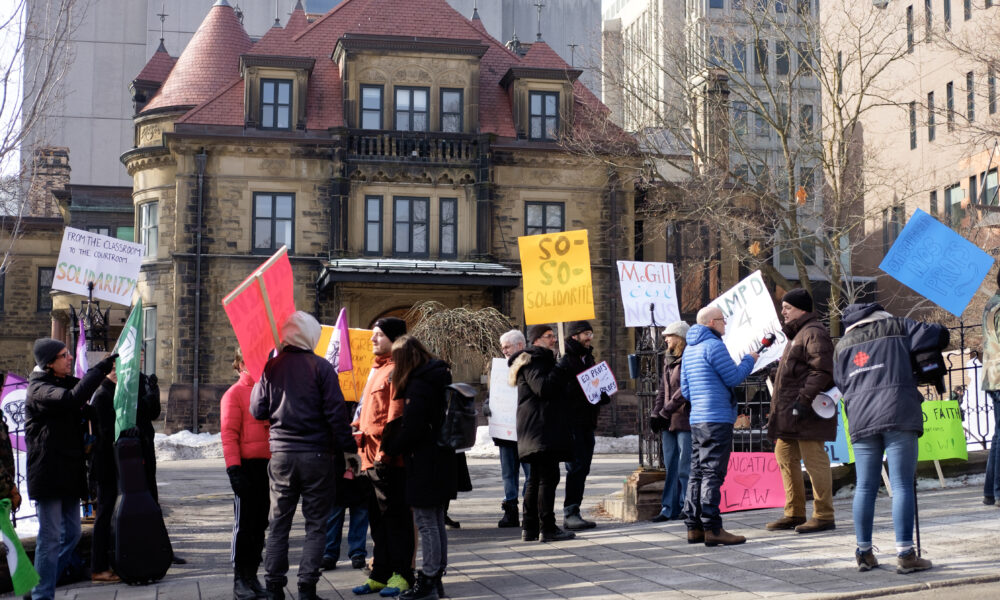The Association of McGill Professors of Law (AMPL) held a one-day strike on Feb. 13 to pressure McGill to return to the bargaining table and negotiate their collective agreement in good faith. The collective agreement, which has been under negotiation for more than a year, will set the terms of employment for tenured and tenure-track professors in the Faculty of Law for three years.
AMPL first started drafting the collective agreement in November 2022 when they were certified by Quebec’s Tribunal administratif du travail (TAT) and became the first faculty union at McGill. However, in a letter to students, AMPL explained that despite the TAT’s decision, McGill continues to contest their certification before the courts and delay the bargaining process, offering AMPL just “two and a half days of negotiation between now and the end of the semester.”
AMPL’s proposal for the collective agreement contains 32 articles, 17 of which have already been resolved. However, in their letter to students, the association stressed that critical aspects of the collective agreement are still being negotiated. These unresolved articles include both monetary proposals, such as salary and employee benefits, and working conditions, including promotions, tenure appointments, and sabbatical leaves.
Evan Fox-Decent, AMPL’s president, told The Tribune that the strike had two key aims. First, AMPL hopes that the strike will compel McGill to set up a reasonable bargaining schedule with meetings once per week. Second, AMPL hopes to pressure McGill to negotiate a collective agreement that is binding for both parties. According to Fox-Decent, although McGill has been willing to negotiate key issues, they have refused to give up the authority to unilaterally change the terms of the collective agreement after the contract has been signed. He highlighted that if McGill retains this unilateral authority, the collective agreement could essentially become moot and called on McGill to negotiate a collective agreement that is mutually binding.
“We’re not striking for a better salary, or for even better work conditions,” Fox-Decent said. “We’re striking for the possibility of better salary and better work conditions just by virtue of getting McGill to agree to actually engage in a process that results in a binding collective agreement.”
Fox-Decent also noted that McGill locked members of the Faculty of Law out of their email and online services on the day of the strike without justification or prior notification.
“The university gave us no notice that we would be electronically locked out, and since then has not provided any justification for its action,” Fox-Decent said.
The Association of McGill Professors of Education (AMPE), which applied to become McGill’s second faculty union in September 2023, supported AMPL at the picket line. Dennis Wendt, AMPE’s interim president, told The Tribune that AMPE has faced similar pushback from McGill in their effort to become certified. Wendt asserted that McGill’s efforts to impede AMPE’s unionization have been unnecessarily obstructionist.
“McGill’s already fought the law and the law won,” Wendt said. “It is a waste of time, waste of money, [and] waste of resources [….] We’re going through a long drawn out process for an inevitable outcome.”
Several student organizations, including the Association of McGill University Support Employees, the Association for Graduate Students Employed at McGill, and the McGill Labour and Employment Law Club (MLELC), also joined AMPL at the picket line. Brette Thomson—a third-year student in the dual BCL-JD program and president of MLELC—underlined the importance of students showing their support for the strike.
“I think it’s absolutely crucial that faculty organizations and student organizations band together,” Thomson said in an interview with The Tribune. “We all have power, power to withdraw our labour and our support and I think that it’s very important that McGill knows that we support our professors.”
Although AMPL members expressed hope that the strike would be effective, Fox-Decent noted that AMPL has the authority to call up to five strike days. AMPL has notified McGill that if they do not have a collective agreement by April 15, they will go on strike once again.
Frédérique Mazerolle, McGill’s media relations officer, declined to comment on the collective agreement discussions, noting that “[McGill] will let the pending negotiation process run its course.”







